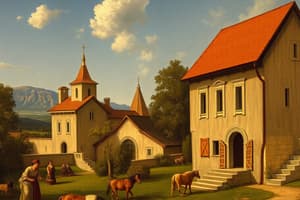Podcast
Questions and Answers
What were two significant social and political structures established during the population increase and rise in world temperatures?
What were two significant social and political structures established during the population increase and rise in world temperatures?
- Manorialism and Feudalism (correct)
- Anarchism and Liberalism
- Totalitarianism and Democracy
- Socialism and Capitalism
Which event in the 11th century involved Christendom trying to gain control over the Holy Land?
Which event in the 11th century involved Christendom trying to gain control over the Holy Land?
- The Crusades (correct)
- The Reformation
- The Great Schism
- The Enlightenment
What major calamity during the Late Middle Ages killed a significant portion of Europe's population?
What major calamity during the Late Middle Ages killed a significant portion of Europe's population?
- The Great Famine
- The Spanish Inquisition
- The Black Death (correct)
- The Hundred Years' War
What is the time frame designated for the Early Middle Ages?
What is the time frame designated for the Early Middle Ages?
What significant cultural revival began in the 14th century as a result of renewed interest in ancient texts?
What significant cultural revival began in the 14th century as a result of renewed interest in ancient texts?
Which event marks the transition from the Middle Ages to the European Renaissance?
Which event marks the transition from the Middle Ages to the European Renaissance?
What major architectural styles emerged during the period leading up to the Late Middle Ages?
What major architectural styles emerged during the period leading up to the Late Middle Ages?
What major development occurred as a result of the Christianization of Europe during the Early Middle Ages?
What major development occurred as a result of the Christianization of Europe during the Early Middle Ages?
Which term is now regarded as a misnomer for the Early Middle Ages?
Which term is now regarded as a misnomer for the Early Middle Ages?
During which time period did significant Viking activity occur?
During which time period did significant Viking activity occur?
Flashcards are hidden until you start studying
Study Notes
Overview of the Middle Ages
- The Middle Ages (Medieval Age) spans from the Fall of Rome (476 CE) to the Fall of Constantinople (1453 CE).
- Period followed the Early Middle Ages (450-1000 CE), initially termed the "Dark Ages" due to perceived intellectual darkness and barbarian violence.
- Modern scholarship argues against the notion of a truly ignorant "Dark Ages"; intellectual and cultural activity persisted.
Early Middle Ages
- Characterized by the establishment of new European identities and kingdoms after the Western Roman Empire's collapse.
- Invasion by Germanic tribes led to significant sociopolitical changes.
- Prominent events include Charlemagne’s reign, Viking activities, the Iconoclastic Controversy, and the rapid expansion of Islam into Northern Africa and Spain.
- The Christianization processes led to the founding of the Holy Roman Empire and the Papacy’s rise as a political power.
High Middle Ages
- Spanning the 11th to 13th centuries, marked by increased social and political organization in Europe.
- Population growth and favorable agricultural conditions improved local economies, establishing Manorialism and feudalism as dominant systems.
- By the end of the 11th century, Christianity had widely spread across Europe.
- The Papacy contested with secular governments, influencing political dynamics.
- The period saw the Crusades aimed at reclaiming the Holy Land from Muslim control.
- Cultural advancements occurred in the arts, sciences, and higher education, with the birth of new universities.
- Architectural styles like Romanesque and Gothic evolved, merging classical elements with new technologies.
Late Middle Ages
- From the 13th to the 15th century, this era was overshadowed by calamities such as the Black Death, which decimated a third of Europe's population.
- Civil wars and religious controversies led to significant social upheaval, including a split within the Catholic Church.
- The Byzantine Empire faced decline, culminating in the fall of Constantinople to the Ottomans in 1453.
- Despite challenges, the 14th century spurred artistic and scientific advancements, coinciding with a renewed interest in classical Greek and Roman texts.
- This revival laid the groundwork for the emergence of the Italian Renaissance.
Studying That Suits You
Use AI to generate personalized quizzes and flashcards to suit your learning preferences.




